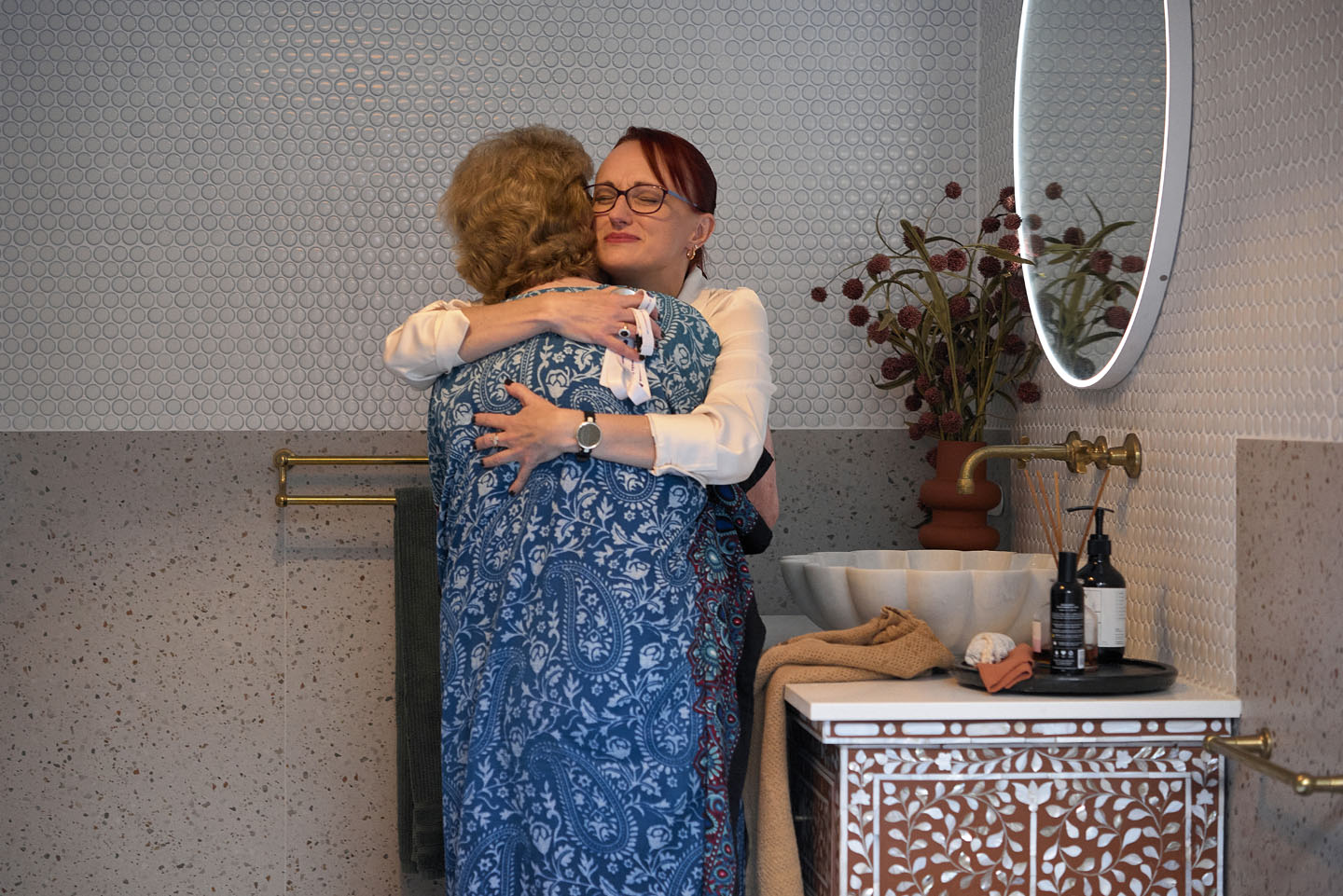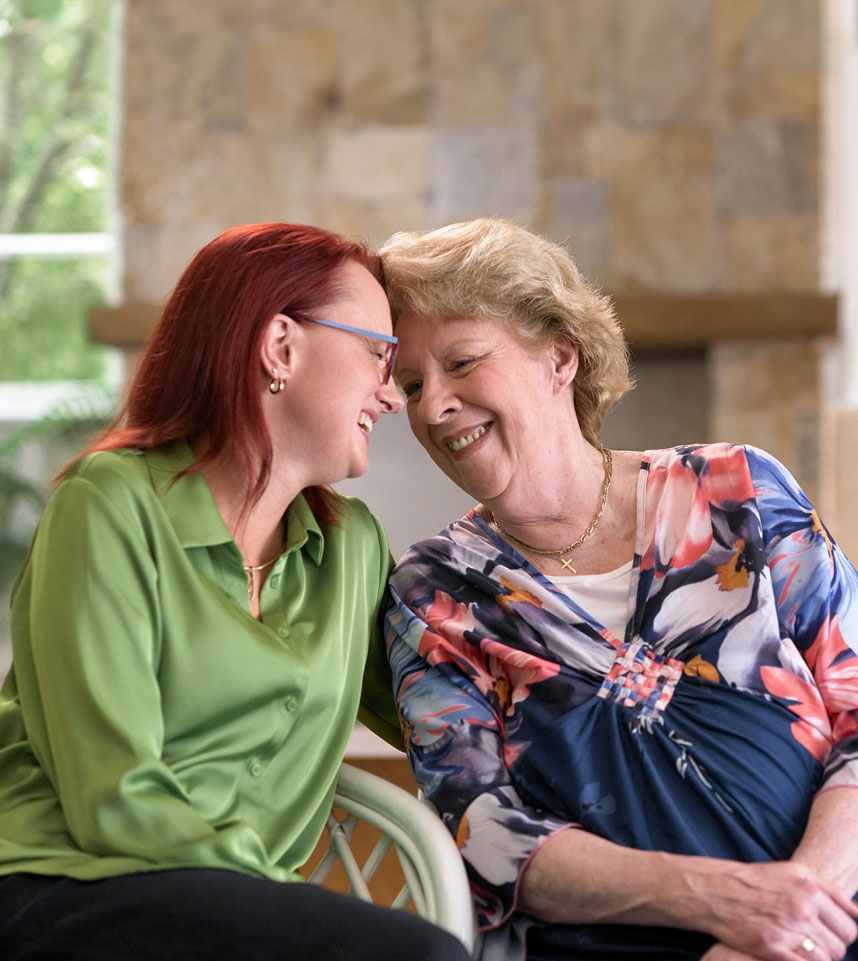5 Tips For Sons or Daughters Whose Parents Are Moving Into Aged Care
Posted 31st May 2024 | 4 minute read
Written by Jesse Gramenz 

The transition into aged care can be hard on everyone. But as a family member, and especially a son or daughter, what can you do to make that transition easier? Are there specific things that can really help? Let's find out.
1. Be willing to take a back seat 🤐
There's a weird paradigm shift that happens when your parents get older.
As they begin to rely on you more, you can almost end up treating them like children.
And before you know it, by the time your parents have moved into aged care, they've grown used to you making every decision.
That's a problem.
The solution: Have conversations with your parents about who is making the decisions early. And when it comes down to it, be willing to let your parents take the lead! Because while it might feel like we're doing our parents a favour by taking the burden completely off them, it might be doing more harm than good.
"I think the change in that is not so much me telling her what to do, because I don't want to take away her autonomy. I still have to respect that she is still my parent, she's still my mother, and she's still older than me, and that deserves a level of respect.
I'm not telling her what to do, but we can have decisions made together."
Sheridan on her relationship with her mother, Grace - Episode 3 of the Navigating Aged Care Podcast

Sheridan (left) with her mother Grace (right) living at St Vincent's Aged Care Heathcote
Sometimes taking a back seat means letting Mum or Dad take risks too! Just because we perceive someone as older and more frail than they used to be, doesn't mean they're not capable. By working with our parents to acknowledge risks (eg. going for a regular walk even if they've had a history of falls), we can still let them live life on their terms and not ours.
Read on:
"I do truly believe it's really important that you have honest conversations, so those roles don't flip. So, the resident feels like they have their own agency and are able to make decisions for themselves and not have their children or next to kin, assuming that they know the person to the point where they're disempowering them."
Mark Aros, Facility Manager from Episode 3 of the Navigating Aged Care podcast
2. Acknowledge the guilt
For most people, there's guilt in helping your parents make the move to aged care.
You might feel like you've let them down. Or maybe you made promises to them that you couldn't actually keep. That's extremely hard.
But one of the best things you can do is acknowledge the guilt and acknowledge that it's normal.
"If we're feeling an enormous amount of guilt, it's a good indication that there's an enormous amount of care there as well. And it's not to say that if there's not an enormous amount of guilt, there's not care, but usually you wouldn't have the enormous feeling if there wasn't.
I think the really important thing is that it's really about the person going into aged care. So, what does that person need? What can you do with your feelings to help support them? And then where can you go to get support with your own feelings as well? So, you may need to talk to some friends, some colleagues maybe even go get some therapy or counseling as well."
Clinical Psychologist Zoe Falster from Episode 2 of the Navigating Aged Care podcast
Remember: It's not your life. You have to be doing what's best for the person you love. And if you've gone on this journey with experts and other people to find out that solution might be aged care, then you have to try and be at peace with that.
Read on:
- How to Prepare for the Transition to Aged Care [6 Helpful Tips]
- 3 Tips For Adjusting to Life in Aged Care [With Advice From a Facility Manager]
3. Learn to accept 'the mourning'
We're not talking about death, but another kind of mourning. One that's equally sweet as it is sad.
See, when your parents go into aged care, your relationship with them changes.
Now, change doesn't necessarily mean it's bad. In fact, after an aged care move, the relationship can actually improve. The parent/child relationship can be reestablished. And your parents can become more like your parents again.
But in the moment, and during that transition, you're mourning.
You're mourning a change in relationship.
It can feel like a loss when that person isn't living with you anymore. It can be a really vulnerable time. There's lots of positive things about it as well, but you do have to be on the lookout for some of those more negative emotions at the same time.
Dr Richard Kane from Episode 2 of the Navigating Aged Care podcast
4. Let the experts help you 👩⚕️
The decision for your parents to move into care isn't yours alone and it shouldn't be. Talk to your loved one. But also, talk to the experts.
You need to do your due diligence and consult the experts to make sure that a move to aged care is the right decision.
- General Practitioners (GPs)
- Geriatricians
- Physiotherapists
It's not on you to make those decisions. And definitely not one to make alone.
A Q & A with a geriatrician from St Vincent's hospitals
Q: Richard, you would have some patients who come in with their family members and they would have quite emotional reactions to the advice perhaps that you might be giving them. How do you navigate that with that family dynamic?
A: Yeah, look, it's often takes time. It often can't be done with a single interaction. Sometimes as you said before, we're working through this professionally. We've got a certain outcome in mind, but we need to be prepared to give families and my patients people time to work through these really complex decisions.
Sometimes it's really helpful. I've seen for me as a doctor to take a level of responsibility for a decision might be in the person's best interests from a health perspective where families are feeling particularly burdened that they may be influencing the decision themselves. So I can say, for example, you've been having so many falls and there's no one around to be able to pick you up, and I can see your family are really worried about that and you are too. So because of your falls, not because of any failure on your part or anything else, it sounds like it makes sense for you to make this transition. So attributing it to a physical or a health course can sometimes be more palatable for people than something that is somehow outside of their control or in some ways their fault. So sometimes I'll adopt that approach.
Other families will really want to have a much more collaborative approach and so that everyone's very much participating and not wanting to follow our medical or clinical lead when it comes to the decision. So, for me, it's often about reading the play and picking the approach, picking the strategy in different situations.
Dr Richard Kane from Episode 2 of the Navigating Aged Care podcast
5. Take your time ⌛
Take your time. Ask dumb questions. Clarify everything.
Aged care is hard enough on its own (even the experts can have trouble explaining it all).
But couple that with an upset parent? Or other family members? Or kids? Things start to get complicated fast.
"As a clinician or as a home manager, [I'm aware] that these decisions are being made and there are really stressful times of people's lives.
So, sometimes you can think I'm communicating wonderfully, but it's not necessarily what the person's taken in, so you really need to check in and get them sometimes to repeat what you're saying just to ensure that what you're saying is getting across. Because I think there's a lot that's missed when you're under stress."
Mark Aros, Facility Manager from Episode 3 of the Navigating Aged Care podcast
While everything can move fast, it's important you understand what's happening every step of the way. And if you don't? Then ask. Not just for yourself, but for your parent too.
"People will take from conversations what they want to take from conversations sometimes as well. And that can be for the person, it can be for their family, it can be for the clinicians as well. I think some of the things that really stand out for me in these conversations are the importance of empathy and validation. So really just giving everyone in the room the chance to reflect and recognize what's going on for them and just letting them know that that makes sense."
Clinical Psychologist Zoe Falster from Episode 2 of the Navigating Aged Care podcast
Parting thoughts
Your family is everything and when it comes to aged care, there's few other times in life that could strain your relationship.
But by arming yourself with an idea of what to expect plus some tips to guide you along the way, you'll be thankful you did your research before going through a tough time in all of your lives.
Still have questions?
CHAT TO OUR AGED CARE EXPERTS
- Home
- Residential Aged Care
- 5 Tips For Sons or Daughters Whose Parents Are Moving Into Aged Care